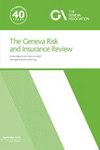时间不一致性和不确定性下的创新与信息获取
IF 1
3区 经济学
Q4 BUSINESS, FINANCE
引用次数: 10
摘要
当一个代理人投资于新的工业活动时,他对项目回报的初始了解有限。获取信息使他既可以减少对该项目危险性的不确定性,又可以限制它可能对人的健康和环境造成的潜在损害。在本文中,我们研究了是否存在agent不获取信息的情况。我们发现,具有时间一致偏好的智能体,以及具有双曲偏好的智能体,都会获取信息,除非获取信息的成本超过他们从该信息中获得的直接收益。然而,一个双曲型的代理人可能会在战略上保持无知,当他获得信息时,他获得的信息会比时间一致型的少。此外,在未来表现为时间一致的代理人的双曲贴现型更倾向于保持无知。然后我们强调,这种战略上的无知取决于信息的精确程度。最后,我们分析了现有责任规则在不确定条件下作为获取信息的激励因素所发挥的作用,并考虑了代理人偏好的形式。本文章由计算机程序翻译,如有差异,请以英文原文为准。
Innovation and Information Acquisition under Time Inconsistency and Uncertainty
When an agent invests in new industrial activities, he has a limited initial knowledge of his project's returns. Acquiring information allows him both to reduce the uncertainty on the dangerousness of this project and to limit potential damages that it might cause on people's health and on the environment. In this paper, we study whether there exist situations in which the agent does not acquire information. We find that an agent with time-consistent preferences, as well as an agent with hyperbolic ones, will acquire information unless its cost exceeds the direct benefit they could get with this information. Nevertheless, a hyperbolic agent may remain strategically ignorant and, when he does acquire information, he will acquire less information than a time-consistent type. Moreover, a hyperbolic-discounting type who behaves as a time-consistent agent in the future is more inclined to stay ignorant. We then emphasize that this strategic ignorance depends on the degree of precision of the information. Finally, we analyse the role that existing liability rules could play as an incentive to acquire information under uncertainty and with regard to the form of the agent's preferences.
求助全文
通过发布文献求助,成功后即可免费获取论文全文。
去求助
来源期刊

Geneva Risk and Insurance Review
Multiple-
CiteScore
4.30
自引率
0.00%
发文量
8
期刊介绍:
The Geneva Risk and Insurance Review (GRIR), the academic journal of The Geneva Association, is the flagship journal of the European Group of Risk and Insurance Economists (EGRIE). The GRIR publishes original research that advances our understanding of the economics of risk and uncertainty and the management thereof through insurance and other mechanisms.
Specific focus areas include: the economics of insurance products and markets; decision theory under uncertainty; risk sharing or risk mitigation mechanisms for individuals, corporations, and society; market failures related to risk sharing and mitigation mechanisms, including those arising from information frictions and incentive problems; and the role of government in managing risk through regulation or social insurance provision.
The GRIR emphasizes scientifically rigorous research that is well-grounded in economic theory, based on both neoclassical and behavioral approaches. This includes pure theoretical research, empirical or experimental research that aims to test, falsify, or otherwise elucidate existing theoretical work as well as applied theoretical research that is of direct applicability to practitioners and policymakers.
The GRIR is well indexed, including EconLit, the Social Science Citation Index, and RePEC.
Until June 2005, the Journal was published as "The Geneva Papers on Risk and Insurance Theory".
 求助内容:
求助内容: 应助结果提醒方式:
应助结果提醒方式:


